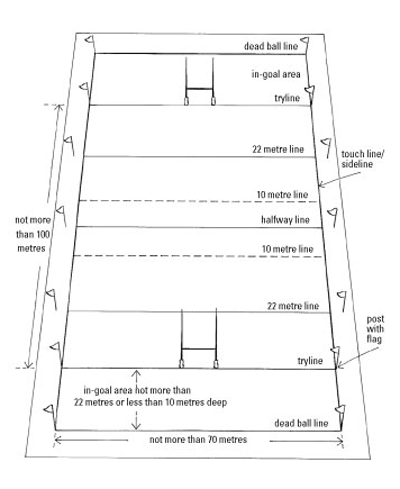>
Rugby Union Attack Positioning
The 15-member teams play rugby union on a grass field that measures no more than 100 metres long by no more than 70 metres wide. The forwards and back getting ready to attack position themselves as follows:

>
>
>
How Players Can Score in Rugby
While the basic aim of rugby is to score a try, players can get points on the board in many different ways. You can score points as follows:
A try is worth five points, which is the most number of points you can score at once.
A penalty try is worth exactly the same as a normal try — five points.
A converted try is worth seven points: Five points are awarded for the initial try and two more are awarded when the goal kicker kicks the ball over the crossbar.
A field goal earns the goal kicker’s team three points.
A penalty goal is worth three points.
>
>
>
Who Are the Super Rugby Teams?
Super Rugby revolves around a 15-team format. A points system that encourages attacking play makes the competition even more attractive to the viewing public. The 15 Super Rugby teams are
The Blues: The Auckland Blues hail from the North Island of New Zealand.
The Brumbies: The ACT Brumbies have their home ground in Canberra Stadium in the Australian Capital Territory.
The Bulls: The Northern Bulls come from the South African city of Pretoria.
The Cheetahs: The Cheetahs are based in the South African city of Bloemfontein.
The Chiefs: The Waikato Chiefs are based in the city of Hamilton on the North Island of New Zealand.
The Crusaders: The Canterbury Crusaders are based in Christchurch on the South Island of New Zealand.
The Force: The Western Force come from the Australian city of Perth.
The Highlanders: The Otago Highlanders are based in the city of Dunedin on the South Island of New Zealand.
The Hurricanes: The Wellington Hurricanes hail from the city of Wellington on the North Island of New Zealand.
The Lions: The Lions hail from the South African city of Johannesburg and were formerly the Cats.
The Rebels: The Melbourne Rebels hail from the Australian city of Melbourne.
The Reds: The Queensland Reds hail from Brisbane, Queensland.
The Sharks: The Sharks are based in the South African city of Durban.
The Stormers: The Western Stormers are based in the South African city of Cape Town.
The Waratahs: The NSW Waratahs are based in Sydney, New South Wales.
>
>
>
The Most Important Rugby Laws
The International Rugby Board controls the game of rugby union worldwide, and part of their job is to determine the laws of the game. The key laws are
Offside: A player is offside in general play if he is in front of a team-mate who is carrying the ball, or in front of a team-mate who last played the ball.
Forward pass: An illegal pass to a player who is ahead of the ball; a player isn’t allowed to pass the ball forward to a team-mate.
Knock on: If a player drops the ball ‘forward’ — that is, towards the opposing team’s tryline — or loses possession of the ball and it goes forward, a scrum is set, with the non-offending team getting the scrum feed.
What goes on at the tackle: A tackle occurs when the ball carrier is held by one or more opponents and brought to the ground. Any opponents of the tackled player who go to ground are known as tacklers.
Foul play: Play deemed by the referee as being dangerous, obstructive, unfair play or misconduct. The offending player is penalised, possibly sent to the sin bin or even sent off.
>
>
>
Knowing a Ruck from a Maul in Rugby
Sometimes it can be tricky for rugby players — and spectators! — to understand the slight difference between a ruck and a maul. But here’s a simple explanation that should help:
In a ruck, the ball is on the ground.
In a maul, the ball is generally in the hands of a player.
To put it simply: Off the ground, it’s a maul; on the ground, it’s a ruck.
>
>
dummies
Source:http://www.dummies.com/how-to/content/rugby-union-for-dummies-cheat-sheet-australianew-z.html
No comments:
Post a Comment